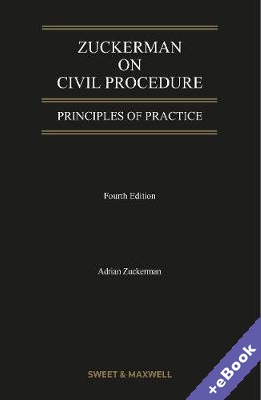
Zuckerman on Civil Procedure presents a clear and thematic analysis of litigation under the Civil Procedure Rules. It explains how the court interprets and applies the Rules, how judges exercise their extensive case management powers and how this impacts the conduct of litigation. Throughout, the emphasis is placed on bringing out the principles that govern the exercise of judicial discretion in order to help judges and practitioners deal with difficult problems that arise in the course of litigation. It helps practitioners understand the relationship between individual Rules and general principles; it complements the White Book and other civil procedure manuals; explains the significance of leading cases and provides critical commentary; highlights current trends in judicial thinking; draws attention to inconsistencies in judicial approach to process and to problems that are likely to be encountered in practice; suggests solutions to debatable questions in areas such as service, legal professional privilege, compliance with time limits, and costs; comments on recent developments; and supplies authoritative analysis – the previous editions have been cited in numerous cases at all court levels.
The new edition is authored by Professor Adrian Zuckerman assisted by a team of editors under the direction of Juliet Wells, including Professor Stuart Sime and Dr John Sorabji. It includes a brand new chapter on Enforcement plus new sections on ADR, opt-in and opt-out class actions, online courts, and non-party costs orders against liability insurers, and is updated to take account of new legislation, case law and recent reviews into the workings of civil justice.
The long-awaited new edition of this seminal work is updated to take account of new legislation, as well as changes to rules and practice directions, including:
Barton v Wright Hassall LLP [2018] UKSC 12: on the proper approach to applications under CPR r.6.15(2) for an order validating service of a claim form which had not been correctly served. The Supreme Court emphasised that Litigants in Person would not usually be held a lower standard of compliance with rules or court orders.
Belhaj v Director of Public Prosecutions [2018] UKSC 33: on the distinction between criminal and civil proceedings, for the purposes of determining whether the Closed Material Procedure set out in the Justice and Security Act 2013 could be used in respect of an application for judicial review of a prosecution decision.
Cameron v Liverpool Victoria Insurance Co Ltd [2019] UKSC 6: on whether a claim for personal injuries following a road traffic accident could be brought against a ‘person unknown’; the Supreme Court considered the requirements of CPR Part 6 on service, and the defendant’s right to receive due notice both of the existence of the proceedings and the contents of the claim.
Cape Intermediate Holdings Ltd v Dring [2019] UKSC 38: the Supreme Court set out the extent of a non-party's right to obtain copies of documents filed in court proceedings and the principles to be applied where a non-party sought access to such documents.
Jet 2 Holidays Ltd v Hughes [2019] EWCA Civ 1858: the Court of Appeal considered whether the service of a dishonest witness statement in purported compliance with a Pre-Action Protocol was capable of amounting to an interference with the administration of justice, so as to engage the court’s common law jurisdiction to commit for contempt.
R (on the application of Jet2.com Ltd) v Civil Aviation Authority [2020] EWCA Civ 35: on the scope of legal advice privilege.